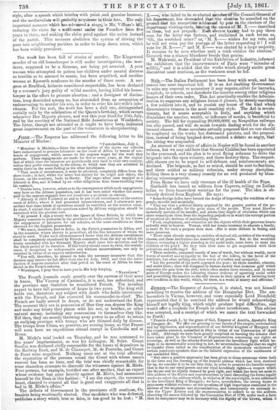( ftautt. — The Emperor has addressed the following letter to his Minister
of Marine :
" Fontainebleau, July 1. "Monsieur le Ministre,—Since the emancipation of the slaves our colonies have endeavoured to procure labourers on the coast of Africa by means of con- tracts of engagement, which secure to the negroes wages for the work they perform. These engagements are made for five or seven years, at the expira- tion of which time the labourers are gratuitously sent back to their own country, unless they prefer remaining in the colony, in which case they are admitted to reside there on the same footing as the other inhabitants. "That mode of recruitment, it must be admitted, completely differs from the slave trade; in fact, whilst the latter had slavery for its origin and object, the former, on the contrary, leads to liberty. The negro when once engaged as a labourer is free, and is bound by no other obligations than those resulting from his contract.
" Doubts have, however, arisen as to the consequences which such engagements may have on the African population, and it has been asked whether the money paid to the negroes engaged does not constitute a premium on slavery.
" Already in 1859 I ordered an end to be put to all recruitment on the eastern coast of Africa where it had presented inconveniences, and I afterwards pre- scribed that these kinds of operations should be restricted on the western coast. In short, I wished that all the questions raised by African emigration should be examined with the greatest care. "At present 1 sign a treaty. with the Queen of Great Britain, by which her Majesty consents to authorize in the provinces of India submitted to her Crown the engagement of labourers for our colonies, on the same conditions as those observed for the English possessions.
" We must, therefore, find in India, in the Frenchpossessions in Africa, and in the'countries where slavery is proscribed, all the free labourers of whom we stand in need. Under such circumstances I desire that the African recruitment shall be completely abandoned by French commerce, from the day on which the treaty concluded with her Britannic Majesty shall come into operation, and for the whole period of its duration. If this treaty should cease to exist, the recruit- ment, if recognized as indispensable and without inconvenience, can only be resumed in virtue of an express authorization. You will, therefore, be pleased to take the necessary measures that this decision may reeeive its full effect from the 1st July, 1862, and that the intro- duction of negroes recruited after that period on the coast of Africa be inter- -dieted in the French colonies. " Whereupon, I pray God to have you in His holy keeping, " NAPOIXOR."
The French journals exult greatly over the success of their arms in Anam. The Viceroy of Cambodia, it is said, has submitted, and the province may therefore be considered French. The invaders expect to have full possession of Anam in two years. The king still holds out, threatens any subject with death who holds intercourse with the French, and has executed his commander-in-chief. The French are badly served in Anam, or do not understand the East. The moment they are in possession of Hue they can depose the King and make any treaty they please with his son, or brother, or other natural enemy, including any concessions to themselves they like. Till then, they are merely throwing away power in an effort to retain an outlying province with troops who are thinned daily by disease. The troops from China, we perceive, are coming home, so that France will soon have no expeditions abroad except in Cambodia and at Rome.
M. Mires's trial :ended on Thursday, and he was sentenced to Eve years' imprisonment, as was his colleague, M. Solar. Count Simeon was declared civilly responsible for the losses of depositors in the Railway Bank, and M. de Chassepot, M. de Pontalba, and Count de Poret were acquitted. Nothing came out at the trial affecting the reputation of the persons round the Court with whose names rumour has been so busy, and the trial was chiefly remarkable for some shameless attempts to discredit the witnesses against M. Mires. Four persons, for example, testified one after another, that an expert whose evidence had gone heavily against M. Mires, had announced himself to the Bank in this fashion : "I am the expert, the venomous beast, charged to conceal all that. is good and exaggerate all that is bad in M. Mires's affairs."
The defeats of Government in the provinces still continue, Or- leanists being continually elected. One candidate who was defeated, publishes a story which, true or false, is too good to be lost : " M. X—, who failed to be re-elected member of the Council-General of his department, has demanded that the election be annulled on the ground that his competitor addressed by post to the electors of the department visiting-cards, hearing the names of M. X— inscribed on than, but not prepaid. Each elector hays n had to pay three sous for the letter was fusions, and exclaimed in such terms as, `Oh, the wretched miser!' or, M. X— wishes for my vote, and he will not even pay the postage of the letter requesting it ! I will vote for M. Z—," and M. Z— was elected by a large majority. It remains to be seen whether such a trick vitiates the election." Coppock was a clumsy blunderer beside that genius. M. Walewski, as President of the Exhibition of Industry, informed the exhibitors that the improvements of Paris were " miracles of eedility," and it is added that the works which already excite great discontent must continue, as the workmen must be fed.






























 Previous page
Previous page